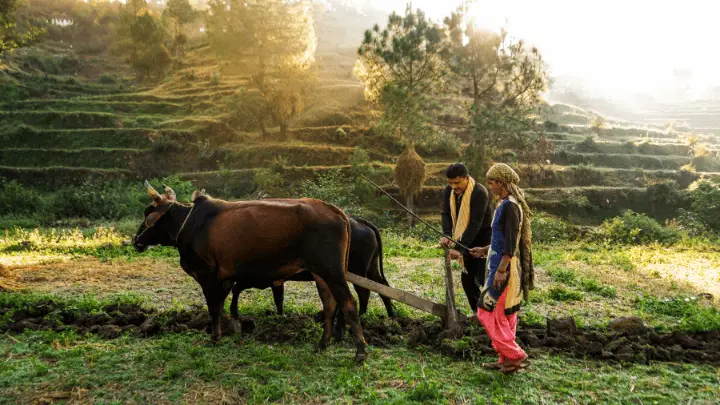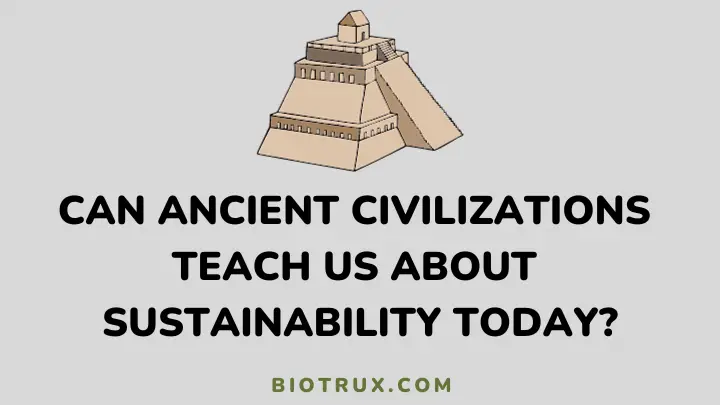Understanding the profound connection of how ancient civilizations can teach us sustainability today unveils a treasure trove of knowledge. These cultures, often deeply rooted in their natural surroundings, have developed sustainable practices that have withstood the test of time.
Whether it’s the ingenious farming methods of the Maya or the urban planning of the Indus Valley, ancient wisdom continues to resonate. Ancient civilizations thrived by nurturing a delicate balance with nature, recognizing that their survival depended on the environment’s health.
The need for sustainability drove their resource conservation, ethical values, and innovations in various fields. By delving into the wisdom of our ancestors, we gain valuable insights into addressing today’s pressing environmental challenges.
Their knowledge is a beacon, guiding us toward a more sustainable and harmonious future. The following are some ways ancient civilizations can teach us about sustainability today.
1. Sustainable Agriculture

Sustainable agriculture, a valuable lesson from ancient civilizations, is the practice of cultivating crops and raising livestock in a way that ensures long-term environmental health and food security.
These ancient societies, such as the Maya and Indus Valley, demonstrated exceptional expertise in sustainable farming. They employed crop rotation, terraced farming, and responsible soil management to maintain soil fertility.
They were also able to mitigate erosion, thereby effectively conserving the land for future generations. These ancient practices emphasized minimizing waste and promoting harmony between agriculture and nature.
In the modern world, adopting these time-tested techniques can help address contemporary challenges like soil degradation and habitat loss. It can also ensure a consistent and sustainable food supply for a growing global population.
2. Resource Conservation
Efficient and responsible management of natural resources is a crucial lesson ancient civilizations can teach us about sustainability. Ancient cultures like the Inca exemplified resource conservation by reusing materials, such as pottery and tools, and carefully stewarding their forests and water sources.
They understood the finite nature of these resources and the need to protect them for future generations. Today, we can draw inspiration from their practices to combat deforestation, water scarcity, and excessive waste.
Their principles of respect for the earth and resource management can help us preserve the environment and ensure a more sustainable future for all life on Earth.
3. Indigenous Practices
Indigenous practices, as demonstrated by ancient civilizations, offer profound insights into biodiversity conservation and sustainability. The rural communities, deeply connected to their environments, have preserved the delicate balance of ecosystems for generations.
Their traditional knowledge and practices involve safeguarding vital habitats, protecting diverse species, and harmonizing resources with nature. This ancient wisdom underscores the importance of respecting and learning from indigenous cultures to address contemporary environmental challenges.
By adopting indigenous practices, we can contribute to biodiversity conservation and mitigate environmental issues. These practices emphasize the need for sustainable coexistence with our planet’s diverse life forms.
They recognize that a healthy, biodiverse environment is crucial for the well-being of all living creatures, including ourselves.
4. Harnessing Renewable Energy
Harnessing renewable energy, a valuable lesson from ancient civilizations involves utilizing naturally occurring, sustainable energy sources to meet our power needs.
In ancient times, civilizations like the Greeks and Romans harnessed wind and water power for various applications. These early experiments showcased the potential of renewable energy.
Today, we can draw inspiration from their practices to reduce our reliance on fossil fuels. Transitioning to renewable energy sources, such as wind, solar, and hydropower, can significantly lower our carbon footprint and decrease greenhouse gas emissions.
These ancient examples emphasize the importance of embracing clean, renewable energy technologies to ensure a more sustainable and environmentally responsible future for our planet.
5. Innovations in Urban Planning
Innovations in urban planning, as evidenced by ancient civilizations, provide valuable insights into creating sustainable and eco-friendly cities in the modern world.
The ancient Indus Valley city of Mohenjo-Daro is a remarkable example of early urban planning focused on sustainability. Its advanced sewer system, efficient street layout, and well-organized infrastructure serve as a blueprint for today’s sustainable cities.
These ancient practices emphasize the need for well-thought-out, eco-conscious urban planning that minimizes environmental impact. By incorporating these sustainable urban planning principles, we can create cities prioritizing energy efficiency, waste reduction, and a harmonious coexistence with the environment.
Learning from ancient civilizations, we can build cities that are both comfortable for residents and respectful of the planet’s resources, fostering a more sustainable and resilient urban future.
6. Ancient Wisdom and Ethical Values
Ancient civilizations impart invaluable lessons in ethical values and wisdom, emphasizing the symbiotic relationship between humans and nature. Their reverence for the environment and ethical principles guided their actions, ensuring sustainability and harmony.
These ethical values, rooted in respect for all life forms and a deep understanding of interconnectedness, are crucial in the modern pursuit of sustainability. Learning from these ancient teachings, we can cultivate a profound sense of responsibility toward the Earth.
By embracing ethical choices and values such as empathy, conservation, and gratitude, we foster a sustainable mindset. Incorporating these principles into our daily lives and societal frameworks can help us address pressing environmental challenges.
It can also promote ecological balance and create a world where humans and nature thrive harmoniously. Ancient wisdom reminds us that sustainable living begins with ethical choices, shaping a future where our actions safeguard the planet for future generations.
7. Water Management in Ancient Civilizations

Water management in ancient cultures offers essential lessons in sustainable practices that are highly relevant today. Civilizations like the Romans and Indus Valley demonstrated remarkable expertise in efficient water management.
They constructed intricate aqueducts, reservoirs, and fountains even before electricity and irrigation systems to ensure a consistent water supply for their communities. These ancient practices emphasized the responsible and equitable use of water resources, preventing wastage and promoting sustainability.
In the face of modern challenges like water scarcity and pollution, we can draw inspiration from these historical examples. By adopting efficient water management techniques, such as rainwater harvesting, wastewater recycling, and sustainable irrigation methods.
We can address contemporary water issues and ensure a more sustainable and water-secure future. The ancient wisdom of managing water resources wisely is a timeless guide for preserving this vital element for future generations.
FAQs
How can ancient civilizations influence sustainable living today?
Ancient civilizations offer invaluable insights into sustainable agriculture, resource conservation, indigenous knowledge, renewable energy, and urban planning, which can inform our sustainable practices today.
What is the role of indigenous knowledge in sustainability?
Indigenous communities possess a wealth of knowledge on preserving biodiversity and managing ecosystems sustainably, which is crucial for addressing modern environmental challenges.
Can ancient energy sources be integrated into our modern energy systems?
Yes. Ancient energy sources like wind and water power can and have inspired the development of renewable energy technologies, reducing our reliance on fossil fuels.
What are the environmental benefits of sustainable farming techniques?
Sustainable farming techniques help maintain soil fertility, prevent erosion, and reduce the need for harmful chemicals, contributing to a healthier and more sustainable environment.
What can individuals do to promote sustainability based on ancient wisdom?
Individuals can embrace sustainable living practices inspired by ancient civilizations, such as reducing waste, conserving resources, and supporting renewable energy.
Final Thoughts
In the grand tapestry of human history, the wisdom of ancient civilizations can teach us a timeless lesson about sustainability today. These early societies, flourishing amidst nature’s embrace, understood the delicate dance between human existence and the environment.
The legacy of their sustainable practices remains relevant, urging us to reconsider our modern ways. From sustainable agriculture techniques to ethical values, resource conservation, and innovative urban planning, ancient civilizations have left us a legacy of eco-conscious wisdom.
Their teachings emphasize the necessity of treading lightly on the Earth, a message more pertinent now than ever. By embracing the sustainable principles of our forebears, we pave the path to a greener, more balanced future.
In the face of environmental challenges, these ancient lessons serve as our guiding light, reminding us that the wisdom of the past can illuminate the way forward.
You can also learn more about sustainable rural education programs.
Thanks for reading.
